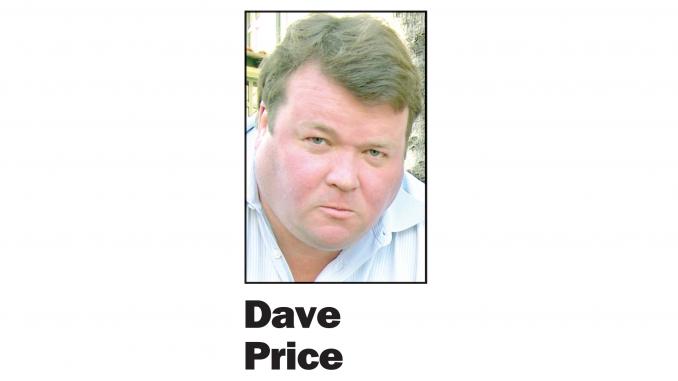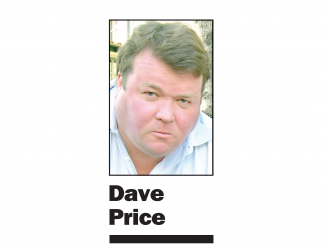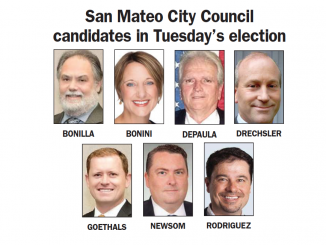
OPINION
BY DAVE PRICE
Daily Post Editor
If you’re an incumbent council member in the mid-Peninsula and you’re thinking about running for another four-year term, ask yourself some questions.
• Have I made the lives of my constituents better in the past four years?
• Have I made it more affordable to live in my community?
• Did rents go down?
• Is it easier to find a place to live?
• Did traffic decrease?
• Did I require developers of new projects to fully abate all problems their projects would cause for the community?
• Are there more small-businesses serving the community? Is it easier now to own a small business now than it was when I got into office?
If you can’t answer “yes” to any of these questions, why on earth are you running again? You had four years and didn’t accomplish anything meaningful to the average resident. Maybe it’s time to do something else.
Voters should ask themselves, which candidates will make this a better place to live?
The difficult thing about council elections is that there aren’t a lot of good candidates. Yes, many people sign up. But most don’t have the experience and ability to improve the city.
Being a “community volunteer” (an actual ballot title I saw in a previous election) might mean you can coordinate a bake sale, but it doesn’t qualify you to run a city.
Too often, first-time candidates are afraid to take positions on important issues. When asked about something crucial, like development or housing, they’ll have a vague response like, “I think both sides have good ideas” or “I’ll listen to the people.” Some will avoid an answer by saying, “I’ll take a balanced approach.”
Tell us what you really think. Don’t try to ride the fence and pretend you’re in both camps. Have the courage of your convictions.
People will respect you if you’re straight with them, even if they don’t agree with all of your positions. Don’t be a phony.
Do your homework
It’s startling how poorly prepared many candidates have been in the past. I always ask the candidates a couple of questions about the city’s finances. Often, they don’t have a clue. I fear that a naive, poorly-informed candidate can be easily manipulated by the powerful forces that want to control our communities.
For example, in many cities, the candidates will be asked by the San Mateo Labor Council or the South Bay Labor Council to visit them for an interview for a possible endorsement. Candidates are anxious to get endorsements, so of course they all agree.
When they sit down with the labor people, they’re handed a contract that lists all the things they promise to support in order to get the interview for the possible endorsement. The contract will, among other things, require that they support the prevailing wage.
Sounds nice, right? Who could be against that? What it means is that the government must pay the so-called prevailing wage, which is really an inflated wage that allows unionized contractors to compete for bids against non-union companies. The downside is that the prevailing wage can double the cost of an affordable housing project. So instead of building, say, 100 apartments, you can only get 50 for the same money. Other government projects, like roads or parking garages, also cost double what the private sector would pay because of the prevailing wage.
If you’re going to sign such a contract, disclose that fact to the voters, so they know who owns you.
Don’t be a rubber stamp
It’s funny, but when the campaign gets going, a labor-backed candidate will be asked if he’s just going to be a rubber stamp and approve big pay raises and pension increases if elected. The union-backed candidate will insist that he’s independent of the union and that the labor endorsement simply means he has broad support in the community. Of course the candidate will never show the voters the union contract he signed.
On the other hand, city managers try to influence candidates too. The manager will ask the candidates to come down to city hall for an orientation session so they can learn about all the things the city does.
That sounds helpful. But sometimes the city manager will discourage candidates from discussing issues that the city employees would rather keep under the rug. In the 2013 Redwood City council campaign, for example, I remember asking two candidates, Corrin Rankin and James “Lee” Han, what they would do about the city’s unfunded pension liability. I was stunned to hear them say that pensions weren’t a problem for Redwood City.
At the time, Redwood City’s unfunded liability was $167 million (now it’s about $239 million). How did they get that idea that pensions weren’t a problem? They said that’s what they were told during the orientation session. The city’s goal was to make sure pensions wouldn’t become an issue in the campaign, and it worked.
As a voter, you should be looking for well-informed, experienced candidates who are actually going to improve your city. Of course finding these people is difficult. Identifying the best candidates is the purpose of the campaigns that will unfold in our cities over the next three months.
Editor Dave Price’s column appears on Mondays. His email address is [email protected].



Neither of the incumbents in Menlo Park, Keith and Ohtaki, would be able to answer “yes” to any of those questions. Traffic is much worse now than it was 4 or 8 years ago. The housing shortage is dire, especially with Facebook bringing in so many workers. This council has done nothing for the people.
I can’t imagine that any incumbent in any office would be able to answer those questions in the affirmative. But are those the right questions? Is our system set up such that in four years, a council member could have meaningful impact in any of those dimensions? I’d suggest that it’s not. If Dave Price thinks otherwise, I’d like to hear more. How exactly should a city council member go toe to toe with the deep pockets of Stanford, Facebook, etc. What leverage does one council member have in those negotiations? What tools are at the disposal of council members to solve regional issues like traffic and housing in a four year time frame? Please point to some real successes achieved by individuals so that we can see how it’s done. Or else maybe we need a realistic bar.
I disagree with CCB, we need to raise the bar, not lower it. If an elected Councilmember is unable to bring about any improvements in the community, then what’s the point of having a Council? or a City government, for that matter?
I didn’t say I thought a council member shouldn’t be able to point to improvements in the community during their tenure. I am concerned with sloppiness around causality and attribution. These are big issues that Price is raising–-regional issues caused by a confluence of factors. The state of our bureaucracy is such that a mere bus shelter can take months, even years to erect. I absolutely agree that saying “no” from time to time makes sense–but I’m not deluded enough to think that an essentially volunteer body of elected officials with day jobs are going to be an even match for the heavy hitters at Stanford and Facebook.
Consider what they are meant to have done:
• Have I made the lives of my constituents better in the past four years?
Surely each incumbent would answer yes to this question and point to some number of projects that were started and came to fruition during their four years. But these are probably going to be more along the lines of bike lanes/bus shelters/neighborhood-level improvements.
• Have I made it more affordable to live in my community?
How on earth is a council member supposed to make it more affordable to live in Palo Alto or Menlo Park over this four-year period of increased growth and jobs-housing imbalance? What levers are at their disposal? Approving a development with some housing? Negotiating a couple of extra affordable housing units from Stanford? Does that really make it more affordable? How would we measure this?
• Did rents go down?
See above. Actually, spoiler alert: no, the rents didn’t go down. Nor will they, until some market event beyond the reach of any individual council member causes layoffs, etc. Demand has so far outstripped supply at this point that there’s no catching up in four years, or even ten.
• Is it easier to find a place to live?
More of the same. And no.
• Did traffic decrease?
Again, unless a council member can personally take credit for the restoration of the Dumbarton Corridor, a massive increase in housing, and/or a mass exodus from the Bay Area, I’m gonna go with no. Nope.
• Did I require developers of new projects to fully abate all problems their projects would cause for the community?
Here the word “fully” raises eyebrows. Again, what leverage do they/we really have? The Stanford project on El Camino Real is an excellent example, actually: Stanford’s BATNA (best alternative to no agreement) in that particular years-long negotiation was to simply sit and do nothing, leaving a massive eyesore on El Camino. This had been going on for years. They had plenty of money to throw at the problem and all the time in the world. And their arrogance in dealing with the Menlo Park City Council demonstrated the solidity of their hand. Sure, council might have squeezed another concession or two out of them. But it was a pretty high stakes game of chicken they were playing.
• Are there more small-businesses serving the community? Is it easier now to own a small business now than it was when I got into office?
Probably not, because a) housing and b) traffic conspire to c) make it almost impossible for businesses to retain low-wage employees.
Look, council members aren’t blameless or perfect and they’ve made some bone-headed decisions, taken some questionable junkets, etc. But to imply that they might have been able to forestall our current housing-traffic nightmare is pretty silly. Hold them responsible for playing the hand they are given with the tools at their disposal. Judge them on the votes they made, the priorities they promoted, the agendas they set, their professionalism, etc.
That’s all.
How do you, as a council person, go “toe to toe” with the likes of Stanford, Facebook, Google, ect.? Tell them “no” occasionally. These companies get away with trashing our communities because nobody on council is willing to reject their proposals. No can be a powerful word if you use it.
@CCB asks, “How on earth is a council member supposed to make it more affordable to live in Palo Alto or Menlo Park”?
How about not raising taxes, even if it means ending big annual raises for city workers? How about not raising fees for city services? That’s something a councilmember controls.
May be CCB is an elected official, an incumbent? And of course councilmembeers and staff want to lower the bar. That’s because they don’t put the public first. They assume they’ll be re-elected without meeting any expectations. Everything the City does should be about improving the lives of residents. Seems their top priority, however, is improving the lives of city employees.